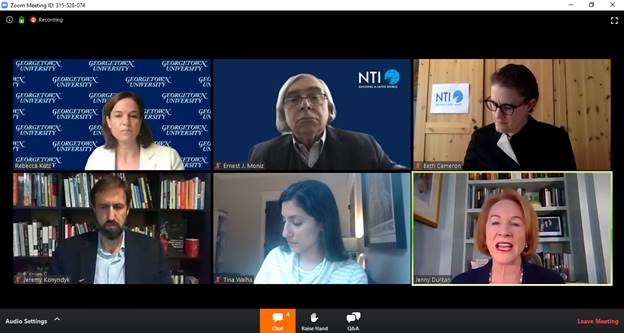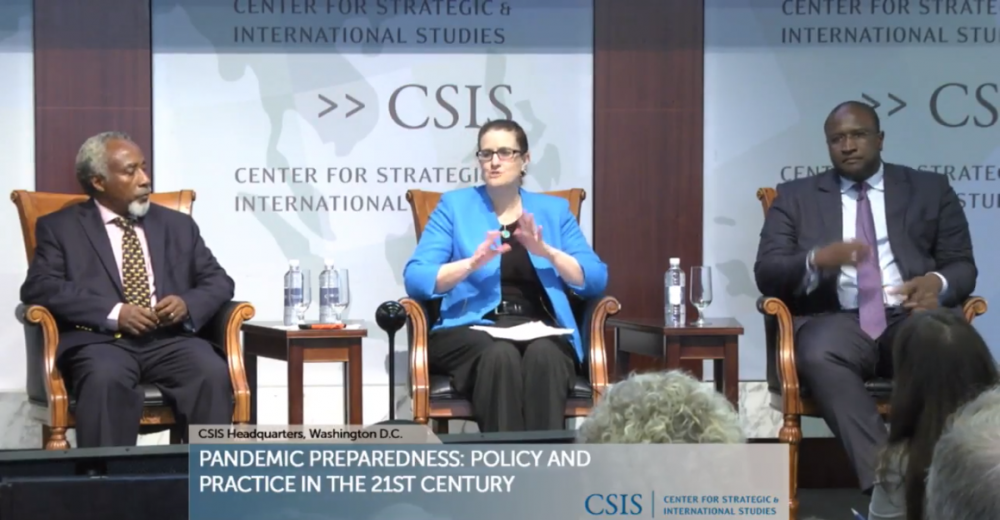
Chris Isaac
Program Officer, Global Biological Policy and Programs
Atomic Pulse
The darkest days of the COVID-19 pandemic most certainly lie ahead as more people are sickened and die while waiting to be vaccinated, but Dr. Margaret Hamburg also likes to focus on the positive: the development and testing of multiple vaccines in record time, important advances in the treatment and management of COVID-19 patients, and the remarkable cooperation between scientists, governments, businesses, and academia that has made progress possible as the world battles the worst health crisis in a century.
Headlining a recent virtual NTI Seminar, COVID-19: Vaccines, Therapeutics, and the Biosecurity Nexus, the former U.S. Food and Drug Administration commissioner and internationally recognized expert on health security and vaccine development said that despite the sobering pandemic statistics, there has been “an amazingly bright spot in the response, which has been seeing the fruits of the investments in science.” Specifically, Hamburg praised the mobilization of the biological research community which has been instrumental in developing the tools needed to save lives.
The most remarkable success story has been the rapid development and manufacture of effective vaccines, Hamburg said. Typically, vaccines have taken between 10 and 12 years to develop, with the previous record being four years. With COVID-19, she said, less than a year since the publication of the SARS-CoV-2 genome made vaccine development possible, pharmacists, nurses, and doctors have begun to administer vaccines.
In addition, there are nearly 200 COVID-19 vaccine candidates in development with several dozen in clinical trials, and several dozen more in the final stages of testing. A few already have shown over 90% efficacy with extremely promising safety profiles.
The vaccines have been developed using a variety of approaches, each of which require technologies with different advantages and disadvantages, Hamburg said. Some vaccines require very specific storage conditions, and they vary on the number of doses necessary and on their levels of efficacy. In addition, some of the vaccines are being produced using platform technologies that can be adapted to counter other emerging diseases.
Important advances in the management of patients with COVID-19—including supportive care and the development and deployment of anti-viral medication, immune suppressants, monoclonal antibody therapy, and the repurposing of older drugs like remdesivir and dexamethasone—have helped reduce deaths and serious complications.
Cooperation across a host of entities also has made an important difference since COVID-19 first made headlines last winter, Hamburg said. The vaccines were developed by harnessing advances in science in technology, but they were developed so quickly because “scientists and companies worked closely with regulatory bodies and academics in order to design trials that could answer the questions in the clinical trials effectively and compress the stepwise function that clinical trials usually have.” Additionally, the involvement of government initiatives to buy doses and de-risk vaccine development allowed companies to make plans to scale manufacturing in advance. She emphasized that it is critical to “work across borders to harness the best that science has to offer.”
Moving into 2021, Hamburg, and NTI Board member who also serves as chair of the NTI | bio Advisory Group, said leaders must think very carefully about responsible stewardship of science as a global enterprise. “When many countries are looking inwards more than ever before, what we really need are more integrated and global strategies for pandemic threats.”
In the meantime, despite the tremendous advances in vaccine development, “no one should think that this is a magic bullet or that with the flip of a switch or jab of a needle that life will go back to normal,” Hamburg said. Even as the vaccines are rolled out, “we’re still going to have to be wearing masks, washing hands, and avoiding large indoor gatherings.”
Watch the seminar here.
Sign up for our newsletter to get the latest on nuclear and biological threats.
Examples from around the world of the Global Health Security Index in-use.
NTI I bio works with others to develop local resource for COVID-19 response
Experts at CSIS Symposium Discuss Ebola Response and Putting Global Health Security Policy into Practice



